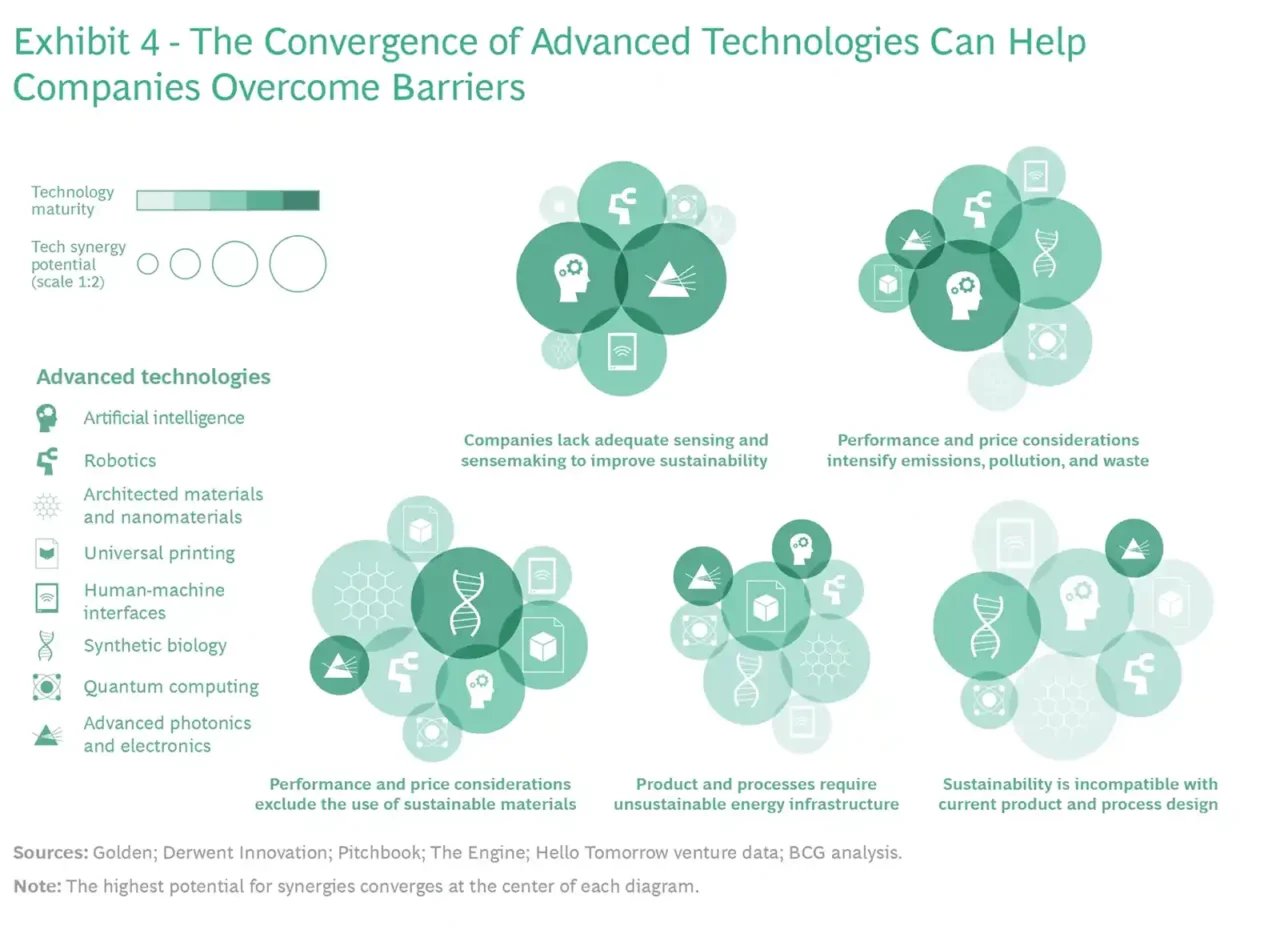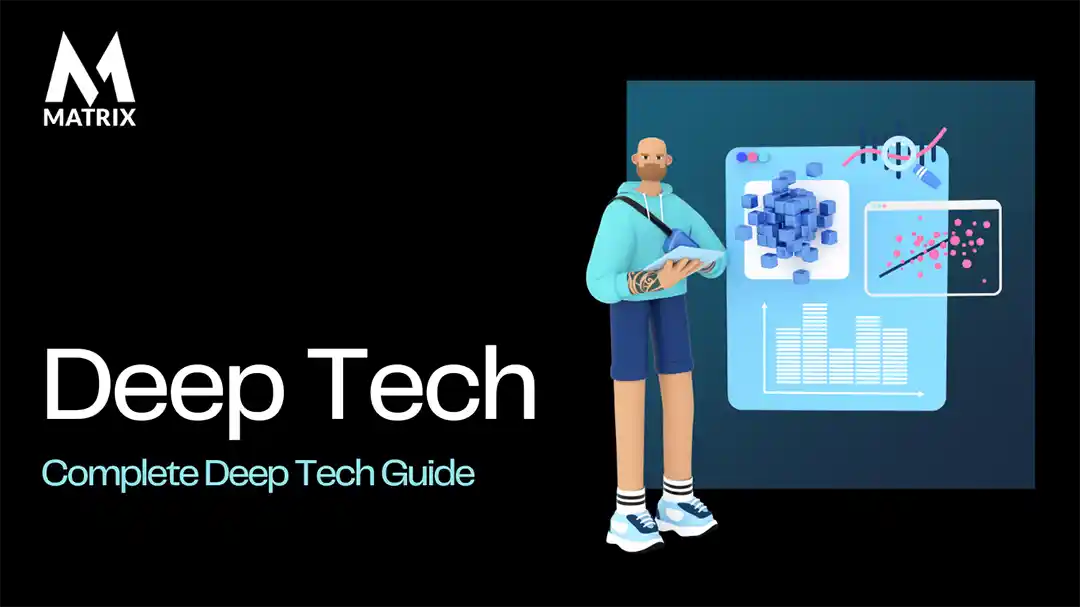Comprehensive Guide to Deep Tech
Learn about deep tech and how to leverage It for growth.
As a CEO, you know that understanding emerging trends and technologies is the key to staying ahead of the competition. One such trend sweeping across industries is ‘Deep Tech’ – encompassing AI, Machine Learning, Robotics advances, and more. To help you get to grips with this dynamic new market sector, we will explore deep technology in greater depth.
In this guide, you will find informative insights into what deep tech entails; learn about its prominent areas; how Google AI and MatrixAI can impact existing markets; and lastly, look at best practices for staying ahead in an ever-changing technological world.
Whether your business functions are ready for intelligent automation or advanced robotics implementation – let’s explore together!
A Complete Deep Tech Guide
In today’s fast-paced world, technology is a key factor in advancement. With that in mind, a deep technology guide is invaluable for those in this field. It provides a comprehensive overview of the latest technological advancements, such as artificial intelligence, blockchain, and machine learning.
With the help of this guide, you can explore these topics in-depth and learn about the latest trends in technology.
Whether you are a beginner or a seasoned professional, this guide is an essential tool anyone in tech should have access to. So, be sure to read it and stay informed about the latest advancements in deep tech.
I. Introduction Deep Tech

Technology has come a long way, and the advancements have been amazing. Deep technology is one such example – pushing the boundaries of innovation to levels we could never have dreamed of before.
Deep technology is about solving problems, uncovering new possibilities, and pushing the limits of what we thought was possible. This broad field encompasses everything from artificial intelligence to quantum computing and beyond.
This technology has many applications, and its potential impact on society is vast. As we continue to dive deeper into this exciting field, the possibilities for what we can achieve are endless.
A. Definition of Deep Tech
In today’s fast-paced technological landscape, a new term has emerged to describe cutting-edge, often complex innovations pushing the boundaries of what we thought was possible just a few short years ago. This term is “Deep Tech,” which refers to revolutionary technologies that often require extensive scientific and engineering knowledge to create. The deep tech definition is straightforward, yet many CEOs don’t know the deep tech meaning.
These game-changing inventions can take many forms, from robotics and artificial intelligence to biotech and quantum computing. What sets deep tech apart from other tech trends is its ability to fundamentally transform how we live, work, and interact with the world around us.
Whether it’s improving healthcare outcomes, revolutionizing manufacturing processes, or unlocking new insights into the mysteries of the universe, deep tech is poised to bring about dramatic changes that we can scarcely imagine today.
B. Importance of Deep Tech in the Modern World
Deep tech is driving the world forward, revolutionizing our lives and work. Every aspect of modern life, from healthcare and finance to transportation and agriculture, is being transformed by cutting-edge technology.
As we continue to face complex global challenges, such as climate change and a growing population, the importance of AI becomes increasingly apparent. These emerging technologies can solve some of the most pressing issues of our time, paving the way for a brighter and more sustainable future.
Whether developing advanced AI algorithms, exploring the mysteries of quantum computing, or harnessing the power of nanotechnology, deep tech is poised to change the world in ways we can hardly imagine.
C. Objective of the Deep Tech Guide
The Deep Tech Guide was created with a specific objective in mind – to help entrepreneurs and startups navigate the complex world of deep tech.
With advancements in technology happening at an unprecedented rate, it can take time to keep up with the latest trends and breakthroughs.
The guide aims to provide a comprehensive overview of various deep tech fields, such as artificial intelligence, blockchain, and biotech while offering practical advice on successfully incorporating these technologies into new business ventures.
Using real-world examples and expert insights, the Deep Tech Guide offers a valuable resource for anyone looking to turn innovative ideas into reality.
II. Understanding the Basics of Deep Tech
Deep tech is a constantly evolving field that requires a basic understanding to keep up with the latest technological advancements.
The term is often used to describe technologies based on scientific research, ranging from artificial intelligence to blockchain. It may sound complex, but at its core, deep tech is all about innovative solutions that tackle real-world problems.
While getting your head around more intricate concepts may take a while, the leap in knowledge is well worth the effort.
Once you start to piece together the basics, you’ll be better equipped to understand the potential of deep tech and how it can help change the world as we know it.
A. The Fundamental Principles of Deep Tech
Deep tech is a term that has been gaining popularity in recent times as we continue to push the boundaries of what’s possible with technology.
At its core, deep tech refers to developing and applying cutting-edge scientific research to create new technologies that can solve real-world problems. The fundamental principles of deep tech can be summed up in a few words: innovation, disruption, and impact.
Companies working in this space are often driven by a desire to create something truly transformative, whether a new type of artificial intelligence, a breakthrough in renewable energy, or a medical innovation that could save lives.
To succeed in this space, businesses must be willing to take risks, embrace failure as a learning opportunity, and work tirelessly to push the limits of what’s possible.
B. Difference between Deep Tech and Other Types of Tech
As technology continues to evolve, it has become increasingly important to differentiate between types of technology. One way to do this is by distinguishing deep tech from other forms of tech. So, what is deep tech?
Deep tech includes cutting-edge technologies based on scientific research and engineering innovation. These technologies can bring about significant shifts in how we live and work. In contrast, other tech types may focus on incremental improvements to existing products or services.
While both forms of technology certainly have their place, deep tech is often seen as having a higher risk and reward potential. As the world becomes more dependent on technology, it will become increasingly important to understand the different forms of tech and their strengths and weaknesses.
C. Notable Deep Tech Innovations
Deep tech innovations have made impressive strides in recent years, particularly in artificial intelligence (AI) and machine learning. Among the most notable developments is the ability of AI algorithms to understand human language, a feat that seemed impossible just a few decades ago.
This technology has far-reaching implications, from making online searches more accurate and efficient to assisting healthcare professionals in diagnosing diseases. Additionally, blockchain technology has enhanced cybersecurity measures, particularly in the financial sector.
These groundbreaking innovations have set the stage for further advances in deep tech, paving the way for even more exciting breakthroughs in the years to come.
III. Key Areas of Deep Tech
Technology constantly evolves, and deep tech is at the forefront of this revolution. It encompasses various areas of technology that involve groundbreaking research and development, pushing the boundaries of what we thought was possible.
From robotics to biotechnology, quantum computing, and artificial intelligence, deep tech paves the way for a brighter future. The key areas of deep tech hold immense potential for solving some of the world’s most pressing problems, ranging from climate change to healthcare.
As we continue to explore and innovate, it’s exciting to see the amazing possibilities that deep tech can offer us.
A. Artificial Intelligence (AI) and Machine Learning (ML)
Artificial Intelligence and Machine Learning are two technologies that have revolutionized our interactions with computers.
AI enables computers to learn and adapt to new challenges, while Machine Learning allows them to automatically improve their performance by learning from data.
These two technologies have become essential in many industries, from healthcare and finance to transportation and entertainment. AI and ML also drive innovation in robotics, natural language processing, and image recognition, potentially creating new opportunities and solving some of the world’s most pressing problems.
Despite some concerns about their impact on jobs and privacy, AI and Machine Learning offer exciting possibilities for a more efficient, smarter, and connected future.
B. Robotics and Automation

The world of robotics, automation, and deep tech companies has been rapidly expanding in recent years, opening up exciting new possibilities and diverse opportunities in industries ranging from manufacturing to healthcare.
With advancements in technology, robots, and machines have become more intelligent, faster, and more versatile, able to perform complex tasks safely and accurately.
This has streamlined processes, reduced errors, and increased productivity in various industries. From collaborative robots assisting workers on the factory floor to surgical robots performing delicate operations with precision, the potential applications of robotics and automation are seemingly limitless.
As these technologies evolve, we can anticipate even greater innovations and advancements that will reshape how we live and work.
C. BioTech and Medical Tech
Biotech and medical tech fields have seen remarkable breakthroughs in recent years as technology advances.
These innovations have given us new ways to treat diseases and ailments while providing more accurate and efficient methods of diagnosis. The development of genetic testing has enabled doctors to identify patients’ susceptibility to certain diseases and conditions, leading to more effective and personalized treatment plans.
Medical technology has also brought us new therapies, such as virtual reality tools, to help patients manage chronic pain and anxiety. With continued innovation, the future of biotech and medical tech looks promising in improving healthcare and enhancing patients’ lives.
D. Quantum Computing
Quantum computing is a fascinating area of study that promises to revolutionize the way we process data. Unlike traditional computers that use binary digits to make calculations, quantum computers use quantum bits or qubits to perform computations.
These qubits can exist in multiple states simultaneously, allowing quantum computers to perform complex calculations at lightning-fast speed. Quantum computing has the potential to solve some of the world’s most challenging problems, such as climate change, drug discovery, and cryptography.
While the technology is still in its infancy, we are excited to witness the incredible progress that is being made in this field, and we can’t wait to see what the future of quantum computing holds.
E. Blockchain and Fintech
Blockchain technology has revolutionized finance, bringing about significant changes and opportunities in the fintech industry. This breakthrough technology has allowed for more efficient and cost-effective transactions while ensuring transparency, security, and decentralization.
By incorporating blockchain into fintech, banks, and other financial institutions can streamline their processes, reduce the risk of fraud, and provide better customer services. The blockchain also drives innovation in peer-to-peer lending, foreign exchange, and remittance.
As we continue to witness the growth of blockchain and fintech, it is undoubtedly a fascinating time to join the financial industry.
IV. Deep Tech in Various Industries
As technology advances, so do the industries that rely on it. Deep tech, representing cutting-edge technologies stemming from scientific research, is now at the forefront of many industries.
From medical devices and fintech to energy and agriculture, deep tech innovations are revolutionizing how we interact with and improve these areas.
For example, medical professionals are now using deep-tech tools to develop implants and prosthetics to help patients regain strength and mobility.
Meanwhile, agricultural innovators are leveraging deep tech to create sustainable and efficient farming practices that can feed the world’s growing population. Deep tech is an exciting frontier with major potential to transform industries as we know them today.
A. Healthcare and Pharmaceuticals
The field of healthcare and pharmaceuticals is ever-evolving, with new advancements and breakthroughs being made all the time.
This industry is crucial in improving public health and well-being, from creating life-saving medications to finding innovative ways to treat diseases.
Pharmacists, doctors, researchers, and other healthcare professionals work tirelessly to ensure patients receive the best possible care and access to the latest treatments. With innovative technologies and the latest research, the healthcare industry will continue to evolve and push the boundaries of what’s possible in medicine.
As patients, we should all be grateful for the teams of dedicated professionals working to improve our health and our lives.
B. Manufacturing and deep tech
The manufacturing industry is evolving rapidly, with an increasing emphasis on incorporating deep tech into production processes. This revolutionary shift has allowed for increased efficiency, productivity, and growth.
Deep tech, such as artificial intelligence and automation, has become a key component in this evolution, driving advancements in everything from supply chain management to product design.
Integrating deep tech in manufacturing has created a world where companies can operate smarter, faster, and with a greater focus on sustainability. It’s an exciting time for the manufacturing industry, and the innovative leaps being made are just the beginning.
C. Agriculture and deep tech
The world of agriculture is changing faster than ever, and deep tech integration is at the forefront of these changes.
The possibilities seem endless, from using drone technology to monitor crops to utilizing artificial intelligence to analyze soil composition. By leveraging these cutting-edge technologies, farmers can optimize crop management and improve their yield while reducing the use of pesticides and fertilizers.
With the global population expected to reach 9.7 billion by 2050, feeding more people with less land and resources is more pressing than ever. It’s exciting to see deep tech’s role in addressing this challenge and shaping the future of agriculture as we know it.
D. Transportation and Logistics
In today’s fast-paced world, transportation and logistics play a crucial role in ensuring the smooth functioning of businesses and industries.
Companies need to move their goods and products safely and efficiently to meet the demands of their customers and stay ahead of their competitors.
From the movement of raw materials to the delivery of finished products, transportation, and logistics comprise various modes of transportation like ships, planes, trucks, trains, and even drones.
The demand for effective transportation and logistics solutions will grow as the world becomes more connected, making it an exciting and dynamic industry.
E. Retail and eCommerce
Retail and eCommerce have rapidly transformed how people shop in the digital era. Online shopping has recently become a convenience and necessity, especially with the pandemic and changing consumer behavior.
With eCommerce, customers can shop from anywhere at any time of the day and receive their products without leaving their homes. This has enhanced the traditional brick-and-mortar shopping experience, allowing businesses to reach a wider audience, increased brand awareness, and ultimately generate higher revenues.
Retail businesses must adapt and create an online presence to remain relevant within the competitive online shopping space. The significance of eCommerce is constantly growing, and businesses must continue to invest in online platforms to remain competitive in the market.
F. Education and deep tech
As technology advances at an unprecedented pace, the world of education has found itself at a crossroads. Introducing deep tech solutions holds the promise of transforming how we learn and absorb knowledge.
From virtual and augmented reality to artificial intelligence and blockchain, students and teachers have access to various innovative tools that can enhance the learning experience like never before. This technology can open up a new world of possibilities, offering personalized learning opportunities, real-time feedback, and even the ability to customize educational modules to suit individual student needs.
Embracing deep tech in education will enable us to meet the challenges of the 21st century and prepare the workforce of tomorrow for the opportunities and challenges that lie ahead.
V. Challenges and Limitations of Deep Tech
The field of Deep Tech has seen remarkable progress over the years, from advancements in machine learning to robotics and biotech. Despite its promise, however, the industry has its challenges and limitations.
One major obstacle is the high complexity of developing and implementing Deep Tech solutions. Technical knowledge and expertise are required at every stage, from research and development to production and distribution.
This makes scaling up Deep Tech investing and ventures much more difficult than in other industries. Additionally, the cost of Deep Tech innovation can be prohibitively high, which may limit its reach to only the most resourced organizations.
Nevertheless, the importance of Deep Tech in driving innovation across a range of fields makes it a critical area of focus and a fascinating one to watch.
A. High Capital Requirements
Starting a business can take time, especially regarding the initial capital requirements. High capital requirements often deter entrepreneurs from turning their ideas into reality, forcing them to give up on their dreams. But why are these requirements so high?
Well, it all comes down to risk. Lenders and investors want to minimize their risk as much as possible, requiring substantial money upfront. While this may seem discouraging, it’s important to remember that securing the funds needed to start a successful business is possible with careful planning and a clear vision.
B. Long Development Cycles
In software development long development cycles are not uncommon in software development. These cycles can last anywhere from several months to several years, depending on the complexity of the project at hand.
Although it can be frustrating for stakeholders to wait for the final product, a thorough and well-planned development cycle can lead to a more successful result. By taking the time to test and refine the software carefully, developers can ensure that it is user-friendly, reliable, and able to meet the needs of its intended audience.
While it may require patience on the part of stakeholders, a long development cycle can ultimately result in a product that is worth the wait.
C. Regulatory and Ethical Considerations
As technology advances and becomes more advanced, professionals must consider the regulatory and ethical considerations surrounding their work.
Regulations are in place to ensure that products and services are safe for use and comply with industry standards. On the other hand, ethical considerations are related to professionals’ moral responsibilities and their impact on society.
In technology, these considerations encompass everything from privacy concerns to data security and beyond. As a professional, it is crucial to be aware of the regulatory and ethical landscape and make compliance decisions that benefit society responsibly and ethically.
D. The Skills Gap and Talent Acquisition
As the job market continues to evolve, there is a growing concern about the skills gap and how it affects talent acquisition.
Simply put, the skills gap refers to the disconnect between job seekers’ skills and the skills companies need to perform their essential functions. With technological advancements and a changing economy, many industries face the challenge of finding high-quality talent with specific, in-demand skills.
This makes talent acquisition an increasingly difficult task for companies of all sizes. As a result, job seekers and employers need to actively close the skills gap and create a more competitive workforce.
E. Technology Adoption and User Acceptance
Technology is an integral part of our daily lives in today’s fast-paced world. Almost every aspect of our lives is touched by technology, from the way we communicate to the way we work. However, the adoption of new technologies is not always an easy process.
Often, there is resistance from users who are comfortable with existing systems. This is where user acceptance comes in – it ensures that users are willing and able to use the new system. To achieve user acceptance, it is important to understand the users’ needs and provide them with adequate support and training.
Ultimately, the success of any new technology project depends on the level of user acceptance and how well the technology meets the needs of the end-users.
VI. Future of Deep Tech
The future of deep tech is a fascinating topic that has captivated the attention of the technology industry and beyond.
With advancements in artificial intelligence, machine learning, and other innovative technologies, the possibilities for deep tech seem limitless. From autonomous vehicles to smart cities, the potential applications of deep tech are vast and varied. The demand for deep tech solutions will only grow as the world becomes increasingly more digital.
As we look towards the future, it is exciting to imagine deep tech’s possibilities and how it will shape the world as we know it.
A. Upcoming Trends in Deep Tech
As technology advances at a rapid pace, the world of deep tech continues to evolve with the introduction of new trends. The upcoming trends promise to change the landscape of technology in various ways.
For instance, we can expect the rise of machine learning and artificial intelligence, which will revolutionize the healthcare, manufacturing, technology, professional services, finance, and transportation industries.
Quantum computing is set to push the boundaries of what’s possible in computing. The emergence of deep tech trends will change how we interact with technology and open up a world of possibilities for innovation in various industries.
B. Role of Deep Tech in Solving Global Challenges
With the rise of global challenges such as climate change, food insecurity, and energy scarcity, technological innovation is more crucial than ever to address these issues.
Deep tech, which typically focuses on solving complex problems using advanced technologies, can potentially be a game-changer in the fight against global challenges. From AI-powered precision agriculture to smart grids and renewable energy solutions, deep tech innovations are helping us create sustainable and resilient societies.
As we face pressing challenges, deep tech will undoubtedly play an instrumental role in shaping the world’s future.
C. Predictions for the Next Decade
As we enter a new decade, it’s natural to look ahead and predict what the next ten years will have in store for us. Many experts believe that technological advancement will continue accelerating, particularly in fields such as artificial intelligence, virtual reality, and robotics.
We can expect to see an increased reliance on renewable energy sources as the world continues to combat climate change. The global population is predicted to reach 8.5 billion by 2030, with urbanization increasing as more people flock to cities.
These changes will undoubtedly bring both opportunities and challenges, and we must use these predictions to prepare for the future.
VII. Opportunities in the Deep Tech Sector
The deep tech sector is a promising industry constantly evolving and creating new opportunities for entrepreneurs and investors alike.
The sector encompasses various technologies, including artificial intelligence, blockchain, robotics, and quantum computing. Unlike traditional tech companies, deep tech startups focus on developing innovative technologies that have the potential to disrupt entire industries.
These disruptive technologies often require significant research and development, making them more challenging to develop and valuable once they reach the market.
As the deep tech sector continues to grow and mature, it is becoming increasingly important for businesses and investors to stay abreast of the latest trends and opportunities. With the right combination of talent, innovation, and resources, the potential for growth in the deep tech sector is virtually limitless.
A. Investment Opportunities
Investment opportunities have become increasingly varied and attractive as the world continues to evolve into a global village.
Traditional options such as stocks and bonds have been joined by emerging opportunities such as cryptocurrencies, impact investing, and real estate crowdfunding. Investors of all stripes can use these diverse options to create a robust portfolio.
For those who embrace risk and are willing to be proactive in choosing investment vehicles, there is almost no limit to the returns that can be achieved. Whether one is a novice or an experienced investor, the key to success is to take the time to research and understand the opportunities available and to have a clear investment plan.
Investing is truly dynamic and exciting, and there has never been a better time to explore the possibilities.
B. Career Paths and Job Opportunities
Career paths and job opportunities are always at the forefront of people’s minds, whether they’re fresh out of college or seasoned veterans of their industry.
When it comes to career paths, there are numerous routes you can take, and it can be hard to decide which one is best for you. Some people want to climb the corporate ladder, while others want to pursue a more entrepreneurial path.
Job opportunities can also vary depending on the industry and your experience level. Researching and determining what you’re truly passionate about and what suits your skill set best is important. The good news is that in today’s job market, endless possibilities and job opportunities await you.
C. How to Get Involved in the Deep Tech Community
As technology advances at an unprecedented pace, deep tech is becoming increasingly vital to our daily lives. If you’re eager to connect with and contribute to the world of deep tech, there are several things you can do to get involved.
First, seek local meetups and conferences on emerging technologies such as AI, quantum computing, and biotech. You can also join online communities and forums dedicated to deep tech to share information and network with like-minded individuals.
Another great way to get involved is to participate in hackathons and coding competitions focusing on creating innovative solutions to real-world problems.
By engaging with the deep tech community, you’ll stay up-to-date with the latest trends and advancements and have the opportunity to make a real impact on the future.
VIII. Conclusion Deep Tech
In conclusion, the world of deep tech is expanding incredibly, leaving us to marvel at the complex and innovative breakthroughs made within this field. From advanced robotics to artificial intelligence, the possibilities seem endless.
We are constantly looking to push the boundaries of technology and make advancements that have the potential to change the way we live. However, with all these advancements comes the responsibility to address important ethical and societal concerns.
It is vital that we keep these in mind as we continue to make progress in the world of deep tech. By doing so, we can ensure that these technologies are developed in a way that benefits us all, both now and in the future.
A. Recap of Key Points Deep Tech
Deep tech has been making waves in recent years, revolutionizing industries and changing the way we approach traditional problems.
This field encompasses technologies such as artificial intelligence, blockchain, and robotics, where the focus is on developing advanced solutions that aren’t necessarily tied to immediate commercial applications. Instead, deep tech has the potential to create a lasting impact on society and to disrupt the status quo.
From enhancing healthcare to transforming manufacturing processes, deep tech is unlocking endless possibilities. As we continue to delve deeper into this world, it’s exciting to see what the future holds and how we can harness its power for the betterment of humanity.
B. Importance of Continued Development and Research in Deep Tech
Deep tech has proven to be a game changer for numerous industries, and the importance of continued development and research in this field cannot be overstated.
With the increasing popularity of artificial intelligence, blockchain, and quantum computing, it is important to keep up with advancements in these areas. This requires a commitment to research and development to stay ahead of the game and maintain a competitive edge.
Deep tech has the potential to reshape the world we live in and create new opportunities for growth and innovation.
By investing in research and development, we can harness the power of deep tech to solve complex problems and improve our lives in countless ways. The future of technology is exciting, and continued development and research will undoubtedly play a critical role in shaping what’s to come.
One of the biggest challenges facing the world of deep tech is the need for accurate and reliable references. With so many complex, cutting-edge technologies emerging rapidly, it can be tough for engineers and developers to stay up-to-date with the latest advancements. That’s why having a strong set of reference materials is so important.
These resources not only help individuals understand the principles and theories behind deep tech but also provide valuable insights into the practical applications of these technologies. Whether it’s books, journals, or online articles, references play a vital role in advancing the field of deep tech and helping us all stay on the cutting edge.
IX. References for Deep Tech and Google AI
As businesses and industries increasingly incorporate deep tech and artificial intelligence into their operations, it’s essential to have access to reliable and informative references in these fields.
Google AI is one of the most prominent players in the tech industry when it comes to advancements in AI. Its services include machine learning, natural language processing, translation, and more.
With Google’s vast resources and expertise, their reference materials can provide invaluable insights and guidance in navigating the complex world of deep tech. Whether you’re a seasoned AI professional or just starting, delving into Google’s AI research and educational resources will deepen your knowledge and understanding of this rapidly evolving field.
One of the biggest challenges facing the world of deep tech is the need for accurate and reliable references. With so many complex, cutting-edge technologies emerging rapidly, it can be tough for engineers and developers to stay up-to-date with the latest advancements.
That’s why having a strong set of reference materials is so important. These resources not only help individuals understand the principles and theories behind deep tech but also provide valuable insights into the practical applications of these technologies.
Whether it’s books, journals, or online articles, references play a vital role in advancing the field of deep tech and helping us all stay on the cutting edge.
All in all, deep tech has become an indispensable part of our modern world, with daily advancements and improvements. From artificial intelligence and machine learning to quantum computing and biotechnology, deep tech transforms how we live, work, and play.
Moreover, it’s revolutionizing multiple industries, including healthcare, manufacturing, agriculture, transportation & logistics, education, and more. We may be in transition to a future where human ingenuity plus machine assistance takes us to new heights in our day-to-day lives. As many technical pathways as there are for staking out a place in the future—deep tech is surely among them.
Understanding its underlying principles will keep you ahead of the curve on pressing new developments and trends. And with AIBrandPad providing insights into brand development using artificial intelligence and machine learning tools—you can now get control of your digital voice today.
General FAQs
How is deep learning being applied to the industry?

Deep learning quickly becomes an invaluable tool for numerous industries, from healthcare to manufacturing. Deep learning applications are virtually endless, from improving medical diagnoses to automating tedious tasks. AI-powered technologies can help companies make more efficient decisions, increase production yields, and reduce costs.
How will deep learning help us solve complex problems?

Deep learning enables machines to process large amounts of data quickly and accurately, making it an ideal tool for solving difficult problems that would otherwise be too complex for traditional methods. By training neural networks on large datasets, machines can interpret patterns and draw conclusions that humans could not detect. With this newfound ability, deep learning can potentially revolutionize many areas of research and development.
What are the ethical considerations for developing deep tech?

As with any new technology, there are important ethical considerations when developing deep tech. For example, privacy and safety issues must be addressed to ensure data remains secure. Additionally, it’s important to consider the implications of artificial intelligence on humans as machines become increasingly capable of performing complex tasks.
How can we ensure fairness in deep tech applications?

Fairness in AI is a growing concern, particularly regarding deep tech applications. To address this issue, researchers are developing a range of measures designed to reduce bias in algorithms. This includes debiasing datasets, adjusting decision thresholds, and implementing human-in-the-loop approaches for monitoring machine output. By incorporating these measures into their models, companies can ensure that AI solutions remain fair and equitable.

